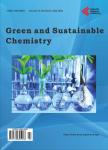ADMET Polymerization: Greener Method for Synthesis of End-Functionalized Poly(Arylene Vinylene)s
ADMET Polymerization: Greener Method for Synthesis of End-Functionalized Poly(Arylene Vinylene)s作者机构:Department of Chemistry Jahangirnagar University Dhaka Bangladesh Department of Chemistry Tokyo Metropolitan University Tokyo Japan
出 版 物:《Green and Sustainable Chemistry》 (绿色与可持续化学(英文))
年 卷 期:2017年第7卷第1期
页 面:1-19页
主 题:Conjugated Polymers Olefin Metathesis Precision Polymerization Defect-Free End-Functionalization
摘 要:Recent results for synthesis of conjugated polymers, poly(arylene vinylene)s exemplified as poly(fluorene vinylene)s and poly(phenylene vinylene)s, by acyclic diene metathesis (ADMET) polymerization have been introduced. The methods using molybdenum and ruthenium catalysts afforded defect-free, high molecular weight polymers with all trans olefinic double bonds, and significant reduction of by-products (halogen, sulfur etc.) in addition of decrease of structurally defects have been attained. The methods also demonstrated precise synthesis of end-functionalized polymers that showed unique optical properties combined with the end groups. Catalytic one-pot syntheses of end-functionalized poly(9,9-dialkylfluorene-2,7-vinylene)s have been attained by both ruthenium (by chain-transfer) and molybdenum catalysts and the method should provide more green route for synthesis of conjugated materials with better device performance.



